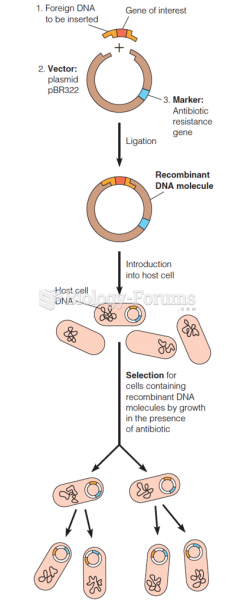|
|
|
In 1886, William Bates reported on the discovery of a substance produced by the adrenal gland that turned out to be epinephrine (adrenaline). In 1904, this drug was first artificially synthesized by Friedrich Stolz.
There are over 65,000 known species of protozoa. About 10,000 species are parasitic.
Children with strabismus (crossed eyes) can be treated. They are not able to outgrow this condition on their own, but with help, it can be more easily corrected at a younger age. It is important for infants to have eye examinations as early as possible in their development and then another at age 2 years.
Aspirin is the most widely used drug in the world. It has even been recognized as such by the Guinness Book of World Records.
Approximately 500,000 babies are born each year in the United States to teenage mothers.







